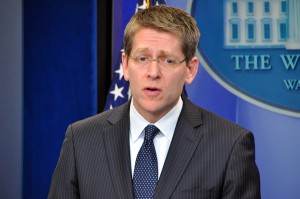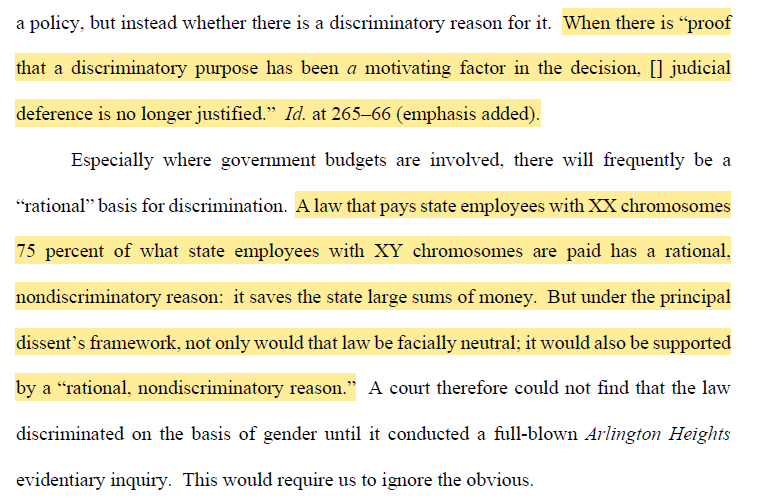National
Reporters hammer Carney on marriage, Biden’s remarks
W.H. spox has no updates, says Duncan was speaking his own views
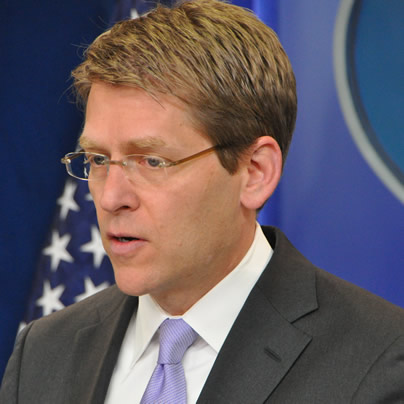
White House Press Secretary faced a litany of questions Monday on same-sex marriage following favorable remarks on the issue that Vice President Joe Biden gave earlier in the week.
The preponderance of the daily news briefing consisted of inquiries attempting to square President Obama’s ongoing evolution with the remarks on same-sex marriage from Biden, who said Sunday he’s “absolutely comfortable” with married gay couples having the same rights as straight couples.
Carney referred to clarification immediately issued Sunday from the vice president’s office saying Biden’s views were in the line with the president — despite his remarks earlier in the day on NBC’s “Meet the Press.”
“I have no update on the president’s personal views,” Carney said. “What the vice president said yesterday was to make the same point that the president has made previously. Committed and loving same-sex couples deserve the same rights and protection enjoyed by all Americans, and that we oppose any effort to rollback those rights.”
Carney said Biden’s comments stirred “a little bit of an overreaction” and said clarification went out from the vice president’s office because reporters sent inquiries and media outlets had the No. 2 in the administration had endorsed same-sex marriage.
As he’s done in the past, Carney said he has no updates on Obama’s marriage evolution; listed the president’s LGBT accomplishments, including repeal of “Don’t Ask, Don’t Tell”; and reiterated the Obama opposes discriminatory efforts against gay couples.
While Biden remarks made up the lion’s share of the questions. Carney also faced questions on Education Secretary Arne Duncan’s endorsement of same-sex marriage earlier in the day on MSNBC’s “Morning Joe.” Carney said the Cabinet official was offering his personal views on the matter.
“Secretary Duncan was asked a question on his personal views on an issue, and he offered them,” Carney said. “Obviously, this is an issue that many people have a view on, and we respect the right of all people to have a personal opinion.”
Under questioning from the Washington Blade, Carney dodged when asked whether he remembers the vice president speaking so favorably as he did in Sunday on the issue of same-sex marriage. Before becoming White House press secretary, Carney was Biden’s communications director for the first two years of the Obama administration.
“I think I will simply point you to what the vice president said yesterday, and the vice president supports this president’s policies in support for LGBT rights,” Carney said.
Carney gave a similar dodge when pressed when asked whether Biden’s remarks represent a sign of progress for the administration on the marriage evolution.
“I would just point you to what the vice president said,” Carney said.
On Sunday, Biden said he’s “absolutely comfortable” with the idea of married gay couples having the “same exact rights” as straight couples, which was reported by many media outlets and bloggers as an endorsement of same-sex marriage. Biden’s office has said his comments weren’t anything new and the vice president is evolving on the issue like President Obama.
The president himself has yet to articulate support for same-sex marriage. In October 2010, Obama said in response to a question from AMERICAblog’s Joe Sudbay that he could evolve to support marriage equality, but hasn’t yet made any announcement.
During the news briefing, ABC News’ Jake Tapper pointed to comments that Obama has made — most recently in Rolling Stone Magazine — saying he doesn’t want to “make news” on his position on same-sex marriage. Tapper said the comment suggests Obama actually supports marriage equality, but doesn’t want to express that view.
In response, Carney said Tapper was making his own characterization of the president’s views on marriage.
“I think when people have asked him that and he has no update to give them or no change in his views to put forward that he’s simply saying that, I have nothing new for you on that; his position is what it was,” Carney said.
Carney said Obama’s record is “considerable and unparalleled” and proceeded to mention some LGBT accomplishments, but Tapper said he doesn’t “want to hear the same talking points 15 times in a row.” Carney responded the president’s accomplishments are serious work.
“We’re talking — talking points to you; serious, substantial rights to others, OK?” Carney said. “Repealing ‘Don’t Ask, Don’t Tell’ is a serious matter. The efforts that this administration has taken on behalf of LGBT citizens are a serious matter.”
In the end, Tapper accused of the administration of being “cynical” by withholding Obama’s support for same-sex marriage presumably until after Election Day.
“And if that is the likely future of the president and this position, given that you don’t have any news to drop on it, or probably his mind has been made up, why not just come out and say it and let voters decide?” Tapper said. “It seems — it seems cynical to hide this until after the election.”
Other noteworthy inquiries why the president opposes bans on same-sex marriage, but doesn’t support same-sex itself. Another reporter from NPR asked whether marriage is a civil liberty, prompting Carney to defer the question to a “civil libertarian.”
The Wall Street Journal’s Laura Meckler asked whether Obama wants the Democratic Party platform to conform to his views on marriage as LGBT advocates have been pushing for an inclusion of same-sex marriage in the document. Carney deferred the inquiry to the Democratic National Committee.
A transcript of the exchange between Carney and marriage questions follows:
Q: …This morning, the Education Secretary, Arne Duncan, put himself on record in favor of gay marriage. Yesterday, the vice president indicated something along the same lines. Does this box the President in ahead of the election? Have his views changed at all on this subject?
Jay Carney: Well, I have no update on the president’s personal views. What the vice president said yesterday was to make the same point that the president has made previously, that committed and loving same-sex couples deserve the same rights and protections enjoyed by all Americans, and that we oppose any effort to roll back those rights. That’s why this administration opposes the Defense of Marriage Act and supports legislation to repeal it. The administration also has stopped defending the constitutionality of Section 3 of the Defense of Marriage Act in legal challenges.
Secretary Duncan was asked a question about his personal views on an issue and he offered them. And obviously this is an issue that many people have a view on and we respect the right of all people to have an opinion — a personal opinion.
Q: If asked at this point a similar question for his personal view, would the president give it?
Carney: I think the President is the right person to describe his own personal views. He, as you know, said that his views on this were evolving, and I don’t have an update for you on that.
…
Q: Jay, the president has raised millions of dollars from LGBT donors, many of whom say that they believe in a second term the President will come out in support of gay marriage. So doesn’t he owe them — or owe voters in general — his direct response and just stop dancing around the issue and telling voters will he or won’t he support gay marriage in a second term?
Carney: The president was asked this and said that his views on — his personal views on this were evolving. The president does have, as you noted, significant support in the LGBT community, and that’s because of his unparalleled record in support of LGBT rights. That includes the fight to repeal successfully “Don’t Ask, Don’t Tell.” It includes signing hate crimes legislation that includes LGBT persons. It includes ending a legal defense of the Defense of Marriage Act. It includes ensuring hospital visitation rights for LGBT patients and their loved ones, and I could go on. His record on the LGBT rights is simply unparalleled, and he will continue to fight for those rights going forward.
Q: Jay, on June 23, he told an LGBT audience, “Everybody deserves to be able to live and love as they see fit. I don’t have to tell the people in this room we’ve got a ways to go in the struggle.” What is he referring to if not gay marriage?
Carney: Well, I think you have heard him say and those in the administration like myself who speak for him that he strongly opposes efforts to restrict rights, to repeal rights for same-sex couples. He has made his opposition to those efforts in various states known and will continue to do so.
I think it’s a statement of obvious fact that full enjoyment of rights by LGBT citizens has not been achieved uniformly across the country. And that’s why he has taken a stand on — in opposition to efforts in some states to deny those rights and discriminate against LGBT citizens.
Q: So can you explain then clearly what — how Vice President Biden, who said, there is a consensus building toward gay marriage in this nation, and then came out yesterday saying that he is absolutely comfortable with men marrying men and women marrying women having equal rights, is not an endorsement of gay marriage?
Carney: Well, I think the Vice President expressed his personal views. He also said he was evolving on the issue.
Q: He did not say that, Jay.
Carney: He did.
Q: No. His spokesperson said that afterwards.
Carney: Let me just be clear, though. The vice president — what he said about the protection of rights of citizens is completely consistent with the president’s position on this issue, and his description of the way the country has moved on this issue I think is wholly accurate. I think we all have seen the data that describes an evolution of views across the country on these issues. So I don’t think there’s anything surprising about him saying that.
Q: You’re trying to have it both ways before an election.
Carney: No. Look, this President has been extremely aggressive in supporting LGBT rights. He fought against those who oppose the repeal of “Don’t Ask, Don’t Tell,” and achieved that in this administration. There are those who want to bring “Don’t Ask, Don’t Tell” back. He very robustly fights against efforts to restrict or deny rights to LGBT citizens and discriminate against them, and he’ll continue to do so.
And again, you didn’t want to hear it, but there’s a long, long list of the actions that this administration has taken on behalf of LGBT citizens in this country. And that’s a record that the President is very proud of.
…
Q: Okay. And back to the same-sex marriage issue. I think one of the issues is that when asked about the president’s position, the president no longer said he is evolving on the issue. He says, I don’t have any news to make on that. That’s what Stephanie Cutter, a few minutes ago on cable said — I don’t have any news for you. The suggestion is that there is news there and you guys are just waiting for the proper time to drop it, likely after November.
Carney: I think that’s your characterization, Jake.
Q: I think that’s what it means —
Carney: I think the president said that he was evolving, and he had — I think when people have asked him that and he has no update to give them or no change in his views to put forward, that he’s simply saying that I have nothing new for you on that. His position is what it was. And that’s with regards to his personal views.
What I think needs to be remembered here is what he has done in office in support of LGBT rights. And that record is extensive and considerable and unparalleled. And he’ll continue to fight for those rights as long as he’s in office.
Q: Positing that the president has done more for LGBT individuals than any other President in history — so you don’t need to say that again — the question is —
Carney: But I will.
Q: Just for this question. When you get to Norah, whatever you want. But the question is, I think there are very few people who think that the president is not going to, after November, whether he’s reelected or not, come out in favor of same-sex marriage. I think there are very few people on the president’s campaign who doubt that; very few people who support the president, very few people who oppose the president who have any doubt that that is what is going to likely happen. And if that is the likely future of the president and this position, given that you don’t have any news to drop on it where probably his mind has been made up, why not just come out and say it and let voters decide? It seems cynical to hide this until after the election.
Carney: Jake, I think the president’s position is well known. He’s spoken to this. It’s gotten a great deal of coverage. I don’t have an update to provide you on the President’s position. It is what it was. I’m sorry you don’t want to hear about the president’s support for LGBT rights because it’s considerable.
Q: It’s not that I don’t want to hear it. I don’t want to hear the same talking points 15 times in a row.
Carney: I think the — talking points to you; serious substantial rights to others. Okay? “Don’t Ask, Don’t Tell” — repealing “Don’t Ask, Don’t tTell” is a serious matter. The efforts that this administration has taken on behalf of LGBT citizens are serious matters.
Q: I’m not belittling that, Jay. We’re talking about same-sex marriage.
Carney: I think that’s the context of this discussion. I just don’t have anything more to give to you on the issue of the President’s views.
Q: Because he’s still evolving. Not because you don’t have news for me, it’s because he’s still evolving.
Carney: It is as it was, yes.
Norah.
Q: Why does the president oppose same-sex marriage?
Carney: I would just point you to what the president has said in the past, both during his campaign for President in 2008 and in answer to a question at the end of 2010. I really don’t have an update for you, Norah.
Q: Is the President comfortable with the fact of men marrying men and women marrying women?
Carney: The president is comfortable with same-sex couples, as the president — the vice president said, being entitled to the same rights and the civil rights and civil liberties as other Americans. And that’s why he has fought for those equal rights and why he’s opposed efforts to discriminate against LGBT citizens and to take away rights that have been established by law.
Q: Biden — the vice president appears to have evolved on the issue, but the president is still evolving — is that a fair characterization?
Carney: I will leave it to individuals to describe their own personal views. What I can explain to you is what the president’s positions are on issues, the actions he has taken at a policy level on behalf of LGBT Americans, and his commitment to continue to take actions on their behalf to protect and defend their rights.
Q: Let me ask you this. You have a number of Democratic governors throughout this country — Governor O’Malley, Governor Cuomo, Governor Malloy, to name a view, now the vice president, who all support same-sex marriage. Why doesn’t President Obama support same-sex marriage?
Carney: I just don’t have an update for you, Norah, on the president’s position on his personal views. I can tell you that he is a absolutely committed supporter of LGBT rights. His record bears that out. It is an unparalleled record of support for LGBT citizens and their rights, and he’s proud of it and he’ll run on it.
And I think that it’s important to remember when we talk about those accomplishments under this administration that they are far more than talking points; they are considerable, serious demonstrations of progress, important progress — progress that others would take away and reverse. This president is committed to not letting that happen.
Q: When you now say the vice president is evolving — he did not say that, as was pointed out, but he used some key words beyond what Norah just quoted. He also said that they are entitled to the same exact rights, all the civil rights, all the civil liberties. Does that mean he supports same-sex marriage?
Carney: I was pointing to this statement that the vice president’s office put out yesterday describing his statements, and I don’t have any elaboration on that. I can tell you that what he said is completely consistent in that paragraph with the President’s views that LGBT citizens should enjoy the same rights and that they should not be discriminated against. And efforts to take away those rights are something that this President strongly opposes.
Q: But how come when the president proposes something like the American Jobs Act — you could name anything — and he says — he travels around the country and says, you’re entitled to press members of Congress, tell them, are they for this or are they against it — why can’t you from this podium say whether or not the President supports or opposes same-sex marriage?
Carney: Well, I can tell you that the president has spoken about this, and that his views have not changed and I have no update to give you on them.
…
Q: Why did the administration feel like they had to put out a statement clarifying what the vice president said?
Carney: Well, I don’t know that the — the office of the vice president put out a statement. I think that there was a lot of interest generated by the comments and the office of the vice president put out a statement to make it clear what the vice president was saying.
But again, I think that there is a little bit of an overreaction here. The Vice President supports and made clear he supports the President’s policies when it comes to protecting the rights of LGBT citizens, and he also has his own personal views about the issue, as does the President, as do most people. So the President’s record on LGBT rights is extensive, and he is committed to working to move forward on that issue.
Q: Is it fair to say that publicly the president and the vice president disagree on gay marriage?
Carney: No, I don’t think that’s what the vice president said yesterday. But again, I don’t think that’s the point. The president and the vice president and everyone in this administration support the initiatives that this president has taken to protect and defend the rights of all Americans, including LGBT Americans.
Q: When it came to the issue of marriage before, there was a time when the president was somebody who believed in deferring it to the states. Does he still feel that way?
Carney: Well, the president believes that the states are deciding this issue, and he has made clear —
Q: — clearly a state issue, not a federal issue?
Carney: Well, I think that we certainly oppose efforts to take away rights at a federal level, which some politicians suppose — a constitutional amendment to deny rights to LGBT Americans across the country — we oppose that. The president opposes that. States have taken action on this issue, and the President believes that when the process works that it’s a positive thing. He also opposes efforts in states to repeal rights or deny rights to LGBT citizens that have already been established.
Q: So what would that put him — where would the president be then on the amendment in North Carolina that would ban gay marriage?
Carney: The president, through the campaign — but the same person opposes efforts to deny the rights of citizens in any state where those rights have been established.
Q: So he opposes — so help me out there. He opposes bans on gay marriage but he doesn’t yet support gay marriage?
Carney: The record is clear that the president has long opposed divisive and discriminatory efforts to deny rights and benefits to same-sex couples. That is a position he has taken that precedes his taking a position in North Carolina. It’s a position he’s taken in other states where this has been an issue. Yes, he is opposed to efforts in states to deny rights that have been provided to citizens.
Q: You understand why there is so much confusion because you’re saying he opposes bans on gay marriage but he’s not yet for gay marriage. I mean, that’s —
Carney: He believes that the states are — marriage is a state issue, and the states have the right to take action on it. What he opposes is efforts to repeal rights that have been granted to LGBT citizens. He thinks that’s discriminatory and wrong.
…
Q: There’s going to be an effort this summer to have support for gay marriage as part of the Democratic platform. Does the president believe it’s important that the platform reflects his views?
Carney: Well, on the issue of the platform, which hasn’t been developed yet, I would refer you to the DNC.
Q: My question was whether the president — this is a question for the president — whether the President thinks that the platform just kind of doesn’t matter, which some people say, or whether it really is a statement of his views whatever those may be?
Carney: I think it’s a statement of the party’s view and has long been that. But I don’t have — I haven’t had that discussion with him. But I think a platform is a statement of a party’s views. It is called a Democratic or Republican Party platform. But for questions about the development of that platform I’d refer you to the DNC.
Q: He is the head of his party.
Carney: Again, I don’t have a different answer for you, Laura. It’s a platform that hasn’t been developed. I would point you to the DNC for questions about it.
Q: Just to get clear on your criteria, you said that you oppose state efforts to take away rights. In North Carolina gays can’t marry now, so what is the reason to oppose North Carolina?
Carney: The referendum would, as I understand it, restrict and deny rights to LGBT Americans. And the president —
Q: That they currently have in North Carolina?
Carney: That’s my understanding, yes.
Q: Okay. My other question is, is marriage a civil liberty?
Carney: You have to ask civil libertarians or lawyers.
Q: Well, in the White House view, is marriage a civil liberty?
Carney: We believe that — the president believes strongly that LGBT Americans should enjoy the same legal rights, and he opposes efforts to deny rights to LGBT American and discriminate against them.
Q: Okay. Just another question. It’s pretty rare when somebody runs for office saying, in effect, I’m getting ready to change my mind. And you’ve really savaged Mitt Romney for changing his mind, and I’m wondering if you don’t run some risk of looking kind of too clever by half here.
Carney: Look, I don’t have an update for you on the president’s personal views. He described them in response to a question. This has gotten a great deal of coverage in the past. That’s the answer he has and I don’t have a new answer for you.
Q: But what would you say is the definition of “evolving”? You’ve said it so many times, it has to mean something specific.
Carney: The president said that his views on this are evolving. I think —
Q: Is he getting ready to change?
Carney: Not necessarily. I think he just said they were evolving. And that’s at a personal level. His views on LGBT rights are crystal-clear and this administration has taken actions that are unparalleled to support those rights. And he’ll continue to take those actions because he thinks that’s the right thing to do.
April.
Q: How could his views be crystal-clear if everybody in this room is needing to ask you questions?
Carney: Chris, I think everybody in this room is reacting in the way that folks often do to one story that takes off and then they run down the field and chase it. They’re reacting to comments on a Sunday show. Nothing has changed in the President’s firm commitment to LGBT rights and nothing’s changed and I have no new information —
Q: — position by the White House.
Carney: It’s the same position. It’s not the position of the White House. The President’s position is —
Q: Then why did you guys send out statements to clarify?
Carney: Because the vice president’s statements were being misinterpreted by some, so he — so there was an effort to clarify it by the office of the vice president.
Q: Jay, what do you think the word “evolving” means?
Carney: But that’s where the president is, okay.
Q: Is he unevolved?
Carney: April.
Q: That means changing.
Q: Okay, now I have the ball, let me run with it.
Carney: Policy positions haven’t changed, Jake. And I can remind you that his support for LGBT rights is unprecedented and compares favorably to anyone else out there in the political arena who’s advocating for these rights. And he’ll continue to support them.
April.
Q: All right, now I’m going to take the ball and run down the field with it real quick. And I want you to dissect the evolution.
Carney: No, I’m not going to, April. I’m sorry, I don’t have anything new for you.
Q: No, no, no, no. Okay, you’re not going to, but can you at least say yea or nay when I kind of try to — (laughter) — here’s the deal. Here’s the deal. Before we heard that it was — he was having a hard time marrying issues of his faith and rights. Is that the evolution? Is that where the evolution issue is a holdup?
Carney: The next time the president has a news conference, if you want to ask him that you’re certainly welcome to. I do not have an update for you on the president’s personal views.
Q: Jay, did the president know before yesterday, did the president know that the vice president was comfortable with men marrying men? Is this something they’ve discussed?
Carney: I don’t have a readout for you of conversations they’ve had on this issue.
Q: Is it something they’ve discussed?
Carney: Again, I don’t have a readout for you of private conversations that they’ve had.
…
Q: Thanks, Jay. Is it still accurate to say, then, that President Obama is opposed to gay marriage?
Carney: I would simply say that his views are evolving, which is what he said. And I don’t have an update for you on that issue.
Amy.
Q: Just to clarify, were you saying that the Vice President’s comments were his personal views? Were you looping it together with Arne Duncan’s views?
Carney: The Vice President spoke very clearly about the President’s policies, and they’re entirely consistent with the policies that this President has supported. He also — he talked about evolution in this country and other issues, and those were personal views. I will simply refer you to the statement that the office of the vice president put out.
…
Q: …As someone who’s worked with the vice president before, do you remember him ever speaking so favorably on the issue of same-sex marriage?
Carney: I think I will simply point you to what the vice president said yesterday. The vice president supports this president’s policies in support for LGBT rights.
Q: But is this a sign of progress?
Carney: I would just point you to what the vice president said.
…
Watch the White House briefing its entirety here (video courtesy White House YouTube page)
National
United Methodist Church removes 40-year ban on gay clergy
Delegates also voted for other LGBTQ-inclusive measures

The United Methodist Church on Wednesday removed a ban on gay clergy that was in place for more than 40 years, voting to also allow LGBTQ weddings and end prohibitions on the use of United Methodist funds to “promote acceptance of homosexuality.”
Overturning the policy forbidding the church from ordaining “self-avowed practicing homosexuals” effectively formalized a practice that had caused an estimated quarter of U.S. congregations to leave the church.
The New York Times notes additional votes “affirming L.G.B.T.Q. inclusion in the church are expected before the meeting adjourns on Friday.” Wednesday’s measures were passed overwhelmingly and without debate. Delegates met in Charlotte, N.C.
According to the church’s General Council on Finance and Administration, there were 5,424,175 members in the U.S. in 2022 with an estimated global membership approaching 10 million.
The Times notes that other matters of business last week included a “regionalization” plan, which gave autonomy to different regions such that they can establish their own rules on matters including issues of sexuality — about which international factions are likelier to have more conservative views.
Federal Government
Republican state AGs challenge Biden administration’s revised Title IX policies
New rules protect LGBTQ students from discrimination

Four Republicans state attorneys general have sued the Biden-Harris administration over the U.S. Department of Education’s new Title IX policies that were finalized April 19 and carry anti-discrimination protections for LGBTQ students in public schools.
The lawsuit filed on Tuesday, which is led by the attorneys general of Kentucky and Tennessee, follows a pair of legal challenges from nine Republican states on Monday — all contesting the administration’s interpretation that sex-based discrimination under the statute also covers that which is based on the victim’s sexual orientation or gender identity.
The administration also rolled back Trump-era rules governing how schools must respond to allegations of sexual harassment and sexual assault, which were widely perceived as biased in favor of the interests of those who are accused.
“The U.S. Department of Education has no authority to let boys into girls’ locker rooms,” Tennessee Attorney General Jonathan Skrmetti said in a statement. “In the decades since its adoption, Title IX has been universally understood to protect the privacy and safety of women in private spaces like locker rooms and bathrooms.”
“Florida is suing the Biden administration over its unlawful Title IX changes,” Florida Gov. Ron DeSantis wrote on social media. “Biden is abusing his constitutional authority to push an ideological agenda that harms women and girls and conflicts with the truth.”
After announcing the finalization of the department’s new rules, Education Secretary Miguel Cardona told reporters, “These regulations make it crystal clear that everyone can access schools that are safe, welcoming and that respect their rights.”
The new rule does not provide guidance on whether schools must allow transgender students to play on sports teams corresponding with their gender identity to comply with Title IX, a question that is addressed in a separate rule proposed by the agency in April.
LGBTQ and civil rights advocacy groups praised the changes. Lambda Legal issued a statement arguing the new rule “protects LGBTQ+ students from discrimination and other abuse,” adding that it “appropriately underscores that Title IX’s civil rights protections clearly cover LGBTQ+ students, as well as survivors and pregnant and parenting students across race and gender identity.”
Federal Government
4th Circuit rules gender identity is a protected characteristic
Ruling a response to N.C., W.Va. legal challenges
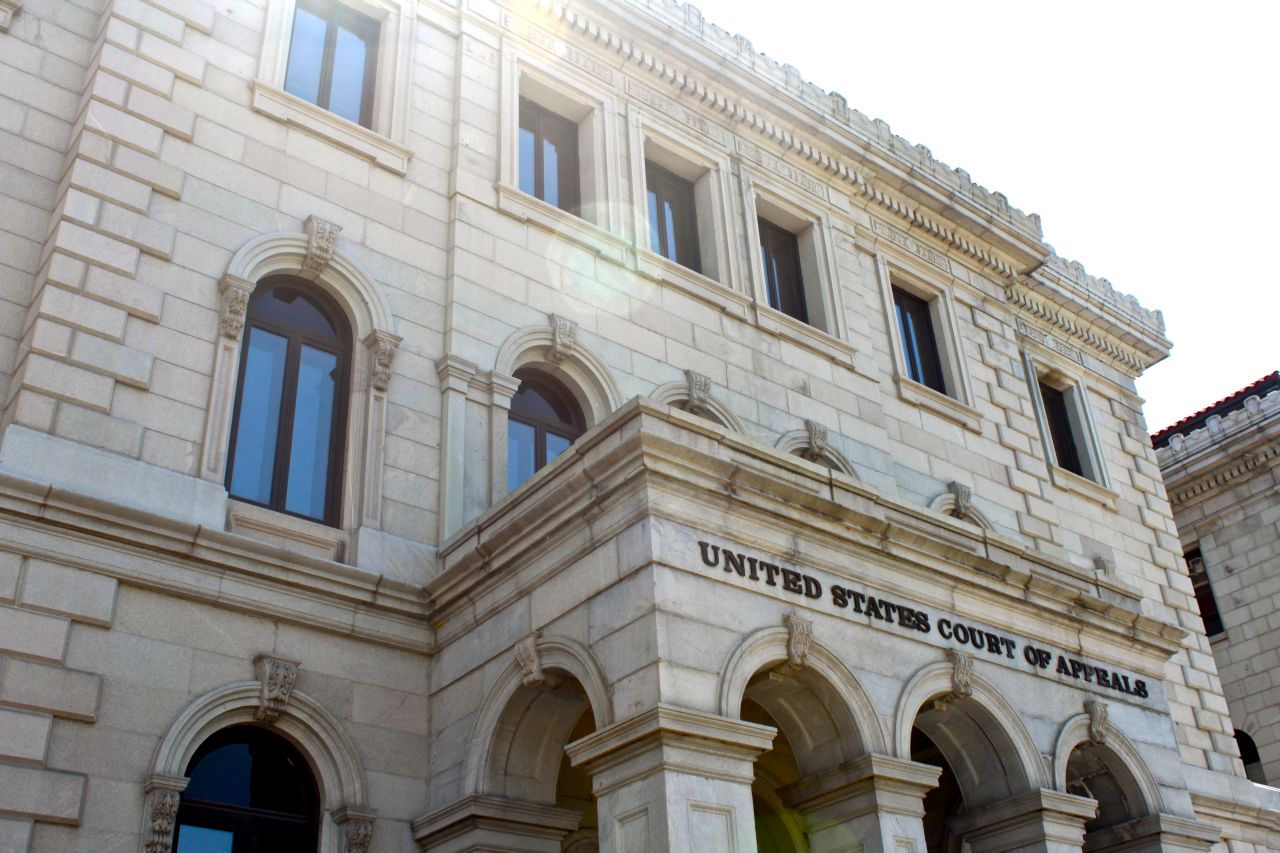
BY ERIN REED | The 4th U.S. Circuit Court of Appeals ruled Monday that transgender people are a protected class and that Medicaid bans on trans care are unconstitutional.
Furthermore, the court ruled that discriminating based on a diagnosis of gender dysphoria is discrimination based on gender identity and sex. The ruling is in response to lower court challenges against state laws and policies in North Carolina and West Virginia that prevent trans people on state plans or Medicaid from obtaining coverage for gender-affirming care; those lower courts found such exclusions unconstitutional.
In issuing the final ruling, the 4th Circuit declared that trans exclusions were “obviously discriminatory” and were “in violation of the equal protection clause” of the Constitution, upholding lower court rulings that barred the discriminatory exclusions.
The 4th Circuit ruling focused on two cases in states within its jurisdiction: North Carolina and West Virginia. In North Carolina, trans state employees who rely on the State Health Plan were unable to use it to obtain gender-affirming care for gender dysphoria diagnoses.
In West Virginia, a similar exclusion applied to those on the state’s Medicaid plan for surgeries related to a diagnosis of gender dysphoria. Both exclusions were overturned by lower courts, and both states appealed to the 4th Circuit.
Attorneys for the states had argued that the policies were not discriminatory because the exclusions for gender affirming care “apply to everyone, not just transgender people.” The majority of the court, however, struck down such a claim, pointing to several other cases where such arguments break down, such as same-sex marriage bans “applying to straight, gay, lesbian, and bisexual people equally,” even though straight people would be entirely unaffected by such bans.
Other cases cited included literacy tests, a tax on wearing kippot for Jewish people, and interracial marriage in Loving v. Virginia.
See this portion of the court analysis here:
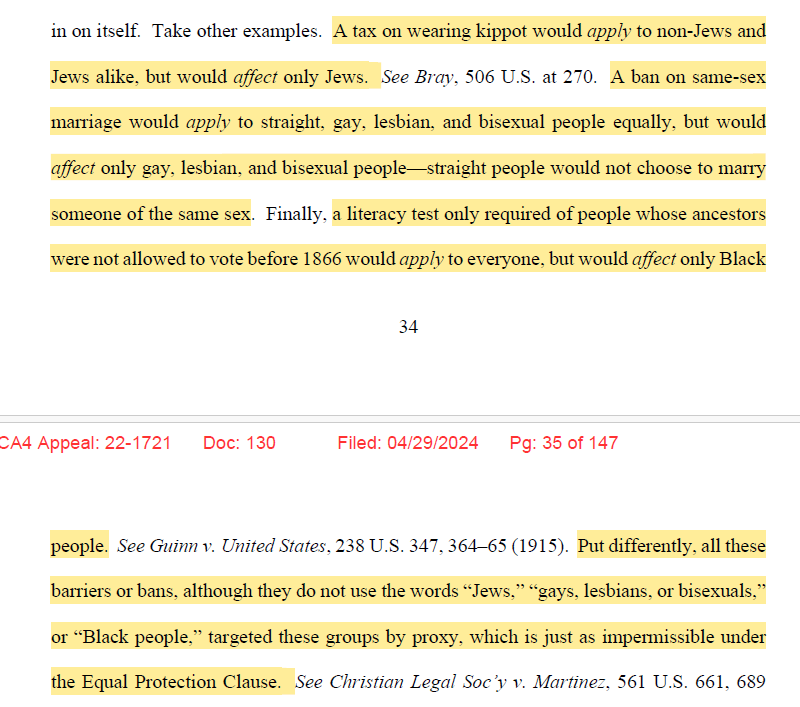
Of particular note in the majority opinion was a section on Geduldig v. Aiello that seemed laser-targeted toward an eventual U.S. Supreme Court decision on discriminatory policies targeting trans people. Geduldig v. Aiello, a 1974 ruling, determined that pregnancy discrimination is not inherently sex discrimination because it does not “classify on sex,” but rather, on pregnancy status.
Using similar arguments, the states claimed that gender affirming care exclusions did not classify or discriminate based on trans status or sex, but rather, on a diagnosis of gender dysphoria and treatments to alleviate that dysphoria.
The majority was unconvinced, ruling, “gender dysphoria is so intimately related to transgender status as to be virtually indistinguishable from it. The excluded treatments aim at addressing incongruity between sex assigned at birth and gender identity, the very heart of transgender status.” In doing so, the majority cited several cases, many from after Geduldig was decided.
Notably, Geduldig was cited in both the 6th and 11th Circuit decisions upholding gender affirming care bans in a handful of states.
The court also pointed to the potentially ridiculous conclusions that strict readings of what counts as proxy discrimination could lead to, such as if legislators attempted to use “XX chromosomes” and “XY chromosomes” to get around sex discrimination policies:
Importantly, the court also rebutted recent arguments that Bostock applies only to “limited Title VII claims involving employers who fired” LGBTQ employees, and not to Title IX, which the Affordable Care Act’s anti-discrimination mandate references. The majority stated that this is not the case, and that there is “nothing in Bostock to suggest the holding was that narrow.”
Ultimately, the court ruled that the exclusions on trans care violate the Equal Protection Clause of the Constitution. The court also ruled that the West Virginia Medicaid Program violates the Medicaid Act and the anti-discrimination provisions of the Affordable Care Act.
Additionally, the court upheld the dismissal of anti-trans expert testimony for lacking relevant expertise. West Virginia and North Carolina must end trans care exclusions in line with earlier district court decisions.
The decision will likely have nationwide impacts on court cases in other districts. The case had become a major battleground for trans rights, with dozens of states filing amicus briefs in favor or against the protection of the equal process rights of trans people. Twenty-one Republican states filed an amicus brief in favor of denying trans people anti-discrimination protections in healthcare, and 17 Democratic states joined an amicus brief in support of the healthcare rights of trans individuals.
Many Republican states are defending anti-trans laws that discriminate against trans people by banning or limiting gender-affirming care. These laws could come under threat if the legal rationale used in this decision is adopted by other circuits. In the 4th Circuit’s jurisdiction, West Virginia and North Carolina already have gender-affirming care bans for trans youth in place, and South Carolina may consider a similar bill this week.
The decision could potentially be used as precedent to challenge all of those laws in the near future and to deter South Carolina’s bill from passing into law.
The decision is the latest in a web of legal battles concerning trans people. Earlier this month, the 4th Circuit also reversed a sports ban in West Virginia, ruling that Title IX protects trans student athletes. However, the Supreme Court recently narrowed a victory for trans healthcare from the 9th U.S. Circuit Court of Appeals and allowed Idaho to continue enforcing its ban on gender-affirming care for everyone except the two plaintiffs in the case.
Importantly, that decision was not about the constitutionality of gender-affirming care, but the limits of temporary injunctions in the early stages of a constitutional challenge to discriminatory state laws. It is likely that the Supreme Court will ultimately hear cases on this topic in the near future.
Celebrating the victory, Lambda Legal Counsel and Health Care Strategist Omar Gonzalez-Pagan said in a posted statement, “The court’s decision sends a clear message that gender-affirming care is critical medical care for transgender people and that denying it is harmful and unlawful … We hope this decision makes it clear to policy makers across the country that health care decisions belong to patients, their families, and their doctors, not to politicians.”
****************************************************************************

Erin Reed is a transgender woman (she/her pronouns) and researcher who tracks anti-LGBTQ+ legislation around the world and helps people become better advocates for their queer family, friends, colleagues, and community. Reed also is a social media consultant and public speaker.
******************************************************************************************
The preceding article was first published at Erin In The Morning and is republished with permission.

